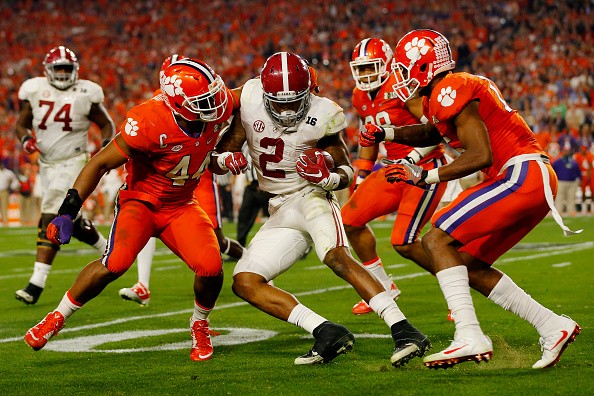It's no surprise NFL players take a regular beating on the field, despite all their protective wear. American Football is a tough sport and one that demands physical perfection at all times. Once a player's suffered an injury, severe or otherwise, how do they build themselves back up time and time again? Let's take a closer look.
Short-Term Sacrifice, Long-Term Pain
One of the most common aspects of the NFL mindset is the idea of playing through the pain. Although this can help in the short-term, ignoring an injury often leads to physical complications further down the line.
Grin and Bear It
A Washington Post survey found that nine out of ten retired NFL players said they played while hurt, with the reason being split equally between "not wanting to disappoint coach" and "because they wanted to."
Playing through pain is seen by many as a deep-seated part of football culture, so much so that players are often celebrated for it. Two weeks before the 2017 Super Bowl, the Atlanta Falcon's center Alex Mack broke his fibula for the second time. Yet despite most people needing six to eight weeks to recover, Mack was given painkillers and played as usual.
The Falcons head coach, Dan Quinn, was quoted as saying, "I just know his toughness and strength is so great," before adding, "I'm not panicked, but I'm concerned." Cut to September last year, and Mack left a game against the Tennesse Titans with an elbow injury.
At the time, Atlanta suffered a frustrating 1-3 start, with many pundits noting that things would be even tougher if the team didn't have its Pro Bowl center. Less than a week later, Mack was back practicing.
The Price of Pain
Mack was lucky. There are many reports of NFL players suffering injuries and failing to recover, or at least retiring before their health gets worse.
Perhaps one of the most famous players to leave the NFL due to injury is Dallas Cowboys quarterback Troy Aikman. Aikman suffered multiple concussions, with each successive hit adding to the risk of serious brain damage.
Courage or Cowardice?
More recently, Indianapolis Colts quarterback Andrew Luck announced his retirement in August last year. Luck explained, "It's been four years of this injury-pain rehab cycle, I can't live the life I want to live moving forward ... I feel quite exhausted and quite tired."
Even so, it came as a shock to many fans. Many of whom, as well as a few critics, questioned Luck's toughness. Unfortunately, such responses are common when dealing with the 'man' s-man game'; there has always been this general idea that NFL players are inherently tough, almost indestructible, even.
Physical Therapy Vs. Medication
So how do players deal with the pain? Rehabilitation is one answer and is needed so frequently that each team has its own physical therapist. However, there are other potentially controversial methods players may use to handle the pain.
Painkillers
They worked for Alex Mack and many other players, but we're not talking over-the-counter pills. Vicodin, Halcion, OxyContin, and Toradol are all strong medications frequently linked with the NFL. Although there is no doubt they work, misuse and drug tolerance mean that for every story of a player handling an injury, there's a story of addiction.
Marijuana
Players who want to use this or related products, such as Cannabidiol extract (CBD), have to do so on the quiet and find ways to avoid periodic tests. When Commissioner Roger Goodell announced the possibility of using CBD, he euphemistically noted: "There are a lot of alternative pain medications and treatments."
This is in part due to what CBD suppliers SabaiDee says involves "an industry filled with no regulations, and no transparency." CBD has no psychoactive effects, and can help reduce inflammation, but is still considered illegal in most states (and in sport) by federal law.
Even so, many NFL players, including the legendary Joe Montana, openly support its use. How this may affect current regulations, though, remains to be seen.
Conclusion
Pain is part and parcel of being an NFL player, and they all deal with it in different ways. Some power through the pain and keep playing, whether it's because they're afraid of losing their job or disappointing the team; others have no choice but to bow out before it gets worse. As former player Rich Orhnberger notes: "Football is about dealing with pain. It's unavoidable...but it wears you down."




